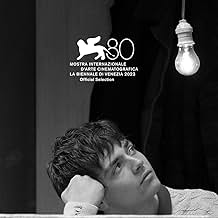Yurt
- 2023
- 1h 56m
ÉVALUATION IMDb
6,8/10
1,1 k
MA NOTE
Ajouter une intrigue dans votre langueFourteen-year-old Ahmet leaves home for an all-boys religious dormitory, navigating family expectations, religious duties, and holding onto childhood amid environmental and personal changes.Fourteen-year-old Ahmet leaves home for an all-boys religious dormitory, navigating family expectations, religious duties, and holding onto childhood amid environmental and personal changes.Fourteen-year-old Ahmet leaves home for an all-boys religious dormitory, navigating family expectations, religious duties, and holding onto childhood amid environmental and personal changes.
- Prix
- 15 victoires et 26 nominations au total
Esila Ergun
- Little Girl
- (as Esila Ergün)
Avis en vedette
Some films entertain, some impress, and a rare few reach directly into your life and show you a truth you hadn't yet found the words for. Yurt(The Dormitory), Nehir Tuna's hauntingly intimate debut, is one of those rare films. It is a quiet masterpiece-so precise in its storytelling, so understated in its emotion, and yet, somehow, so overwhelmingly powerful.
I watched Yurt and, for the first time in my life, felt as if a film had reached me not just as a viewer, but as a human being living through a particular place, time, and atmosphere. Every frame of this film breathes, pauses, and listens. It does not shout or beg to be noticed-it simply exists, fully and truthfully, in a way that feels more like memory than narrative.
The story follows a young boy sent to a religious dormitory, navigating the silence between belief and doubt, masculinity and vulnerability, discipline and desire. The setting-both literal and psychological-evokes suffocation, but never melodrama. Tuna's brilliance lies in his restraint. Instead of imposing judgment, he invites us to sit beside the boy, to see what he sees, feel what he feels, and above all, to remember.
Visually, the film is exquisite. The use of light and shadow is not just beautiful, but meaningful-it conveys everything that cannot be said aloud in this repressive environment. The color palette reflects the emotional state of its characters-faded, cold, sometimes harsh, sometimes warm enough to hint at the possibility of tenderness. Tuna has an exceptional eye, one that understands not only how to look, but when to look, and when to turn away.
What struck me most was how effortlessly the film communicated the complexity of growing up in a space where power, control, and religious ideology intertwine. There's no simplistic good vs. Evil here. Tuna treats each character-even the sternest authority figures-with a kind of compassionate distance. The dormitory itself becomes a metaphor for a society that demands conformity and punishes softness, but it's never reduced to just that. It's more than a symbol; it's a world-one many of us will find painfully familiar.
As someone who teaches a course on "Political Inclusion and Art" , It captures the nuances of our political and social reality without didacticism, without slogans, and with a depth that only great art can offer. It tells the story of a generation growing up under quiet, everyday pressures-expectations about who they should be, how they should feel, what they should believe. But it tells that story with care, patience, and immense artistic control.
Nehir Tuna is a filmmaker whose lens understands the youth of this country better than any political analysis. His gaze is not just observant, it is human. He does not dramatize suffering-he simply shows it, in its slow, real, and often invisible forms.
Thank you, Nehir Tuna, for making something so precise, so compassionate, and so needed. You've given us a story that lingers-and a silence that speaks louder than anything else.
I watched Yurt and, for the first time in my life, felt as if a film had reached me not just as a viewer, but as a human being living through a particular place, time, and atmosphere. Every frame of this film breathes, pauses, and listens. It does not shout or beg to be noticed-it simply exists, fully and truthfully, in a way that feels more like memory than narrative.
The story follows a young boy sent to a religious dormitory, navigating the silence between belief and doubt, masculinity and vulnerability, discipline and desire. The setting-both literal and psychological-evokes suffocation, but never melodrama. Tuna's brilliance lies in his restraint. Instead of imposing judgment, he invites us to sit beside the boy, to see what he sees, feel what he feels, and above all, to remember.
Visually, the film is exquisite. The use of light and shadow is not just beautiful, but meaningful-it conveys everything that cannot be said aloud in this repressive environment. The color palette reflects the emotional state of its characters-faded, cold, sometimes harsh, sometimes warm enough to hint at the possibility of tenderness. Tuna has an exceptional eye, one that understands not only how to look, but when to look, and when to turn away.
What struck me most was how effortlessly the film communicated the complexity of growing up in a space where power, control, and religious ideology intertwine. There's no simplistic good vs. Evil here. Tuna treats each character-even the sternest authority figures-with a kind of compassionate distance. The dormitory itself becomes a metaphor for a society that demands conformity and punishes softness, but it's never reduced to just that. It's more than a symbol; it's a world-one many of us will find painfully familiar.
As someone who teaches a course on "Political Inclusion and Art" , It captures the nuances of our political and social reality without didacticism, without slogans, and with a depth that only great art can offer. It tells the story of a generation growing up under quiet, everyday pressures-expectations about who they should be, how they should feel, what they should believe. But it tells that story with care, patience, and immense artistic control.
Nehir Tuna is a filmmaker whose lens understands the youth of this country better than any political analysis. His gaze is not just observant, it is human. He does not dramatize suffering-he simply shows it, in its slow, real, and often invisible forms.
Thank you, Nehir Tuna, for making something so precise, so compassionate, and so needed. You've given us a story that lingers-and a silence that speaks louder than anything else.
The movie makes us watch the panorama of Türkiye in the 90s. This panorama is so narrow, so cramped that it looks like it is inside a dormitory. Ahmet and Hakan are stuck like each of us, looking for freedom. There were parts where I watched with bated breath. Spoiler: The only part I couldn't understand was what was Ahmet's father's motivation for a radical change? Would it make a big difference if the movie showed us this? I don't think so. Definitely a must watch. The movie Yurt reminded me of this quote. "Yours is not despair, it's boredom. Everyone alive has hope." Everyone alive has hope. No matter what our choices are. Just like the action of running away, which Ahmet sees as a last resort.
10Alper-72
Yurt is truly an impressive and thought-provoking piece. It masterfully narrates a child's struggle to find themselves within the constraints imposed by society. Nehir Tuna's direction, atmosphere, and storytelling are highly successful.
In particular, the scenes reflecting Ahmet's inner world deeply affected me. On one hand, he is caught between his father's and society's expectations, and on the other, he begins to question the rules after meeting a freer character like Hakan. This internal conflict is portrayed very realistically. The anxiety, helplessness, and curiosity in Ahmet's eyes were palpable in every scene.
The film's way of depicting the environment of the dormitory, the pressure, and how individuality is disregarded was quite striking. The dark and oppressive tones perfectly matched the story's atmosphere. In some scenes, I truly felt as if I were inside that environment.
Additionally, the film subtly weaves in elements of the political atmosphere of the era. Details like Sevinç's use of the word "Aczmendi" remind viewers of 1990s Turkey and its conservative structure. These elements are integrated into the narrative in a natural flow, without being overly blatant.
While watching this film, I couldn't help but put myself in Ahmet's shoes. His internal conflict, the obligation to conform, and the burgeoning desire for freedom all felt incredibly familiar to me.
Ahmet's growth in an environment trying to box him in-caught between the desire to belong and the need to be free-reminded me exactly of my own experiences. That silence, the waiting to be understood without saying anything, questioning whether he is doing the "right" thing with every move he makes...
I was reminded that courage is contagious, but it also comes with a cost. In the final scenes, Ahmet's eyes perhaps showed for the first time that he truly understood things. At that moment, Ahmet was no longer present; I was.
Hakan's fate and Ahmet's inner journey seem to be left for the audience's interpretation. For some, this might appear as an unresolved ending, yet I believe it makes the message the film aims to convey even stronger.
In conclusion, Yurt is not just a coming-of-age story, but a film that questions the impact of society on the individual. It is definitely one of those productions that should be watched.
In particular, the scenes reflecting Ahmet's inner world deeply affected me. On one hand, he is caught between his father's and society's expectations, and on the other, he begins to question the rules after meeting a freer character like Hakan. This internal conflict is portrayed very realistically. The anxiety, helplessness, and curiosity in Ahmet's eyes were palpable in every scene.
The film's way of depicting the environment of the dormitory, the pressure, and how individuality is disregarded was quite striking. The dark and oppressive tones perfectly matched the story's atmosphere. In some scenes, I truly felt as if I were inside that environment.
Additionally, the film subtly weaves in elements of the political atmosphere of the era. Details like Sevinç's use of the word "Aczmendi" remind viewers of 1990s Turkey and its conservative structure. These elements are integrated into the narrative in a natural flow, without being overly blatant.
While watching this film, I couldn't help but put myself in Ahmet's shoes. His internal conflict, the obligation to conform, and the burgeoning desire for freedom all felt incredibly familiar to me.
Ahmet's growth in an environment trying to box him in-caught between the desire to belong and the need to be free-reminded me exactly of my own experiences. That silence, the waiting to be understood without saying anything, questioning whether he is doing the "right" thing with every move he makes...
I was reminded that courage is contagious, but it also comes with a cost. In the final scenes, Ahmet's eyes perhaps showed for the first time that he truly understood things. At that moment, Ahmet was no longer present; I was.
Hakan's fate and Ahmet's inner journey seem to be left for the audience's interpretation. For some, this might appear as an unresolved ending, yet I believe it makes the message the film aims to convey even stronger.
In conclusion, Yurt is not just a coming-of-age story, but a film that questions the impact of society on the individual. It is definitely one of those productions that should be watched.
I LOVE THIS!
An absolute feast of cinematic delights... From breathtaking cinematography to richly textured screenplay... This is a very very special film.
There's no point in telling the synopsis... The director, Nehir Tuna, uses the 'show, not tell' strategy to present this unique coming-of-age story... A wealthy teenage boy in 1996 Turkey parallelly attending a private school for rich kids and a religious school for poor kids where he also lives in a dormitory or Yurt... It is filled with countless fleeting moments of quiet observations and subtle commentaries on power, politics, love, rage, religion, obsession, friendship, class difference, income inequality, maturity and much more... which makes this film so Effective and Unforgettable.
Can't wait to watch more films from this director. Top-notch craftsmanship.
An absolute feast of cinematic delights... From breathtaking cinematography to richly textured screenplay... This is a very very special film.
There's no point in telling the synopsis... The director, Nehir Tuna, uses the 'show, not tell' strategy to present this unique coming-of-age story... A wealthy teenage boy in 1996 Turkey parallelly attending a private school for rich kids and a religious school for poor kids where he also lives in a dormitory or Yurt... It is filled with countless fleeting moments of quiet observations and subtle commentaries on power, politics, love, rage, religion, obsession, friendship, class difference, income inequality, maturity and much more... which makes this film so Effective and Unforgettable.
Can't wait to watch more films from this director. Top-notch craftsmanship.
10soulpark
When I first saw the trailer, I was genuinely excited and eagerly looking forward to watching it. There was something about the atmosphere and the visuals that instantly caught my attention and stayed with me. Last night, I finally had the chance to see it-and I absolutely loved it. It exceeded all my expectations and left a lasting impression. Both in terms of storytelling and cinematography, it was one of the most powerful, visually stunning, and emotionally captivating films I've seen in a long time. Every frame felt intentional, every moment meaningful. I can't recommend it enough-truly a must-watch.
Le saviez-vous
- AnecdotesYURT is a Turkish-German-French co-production.
Meilleurs choix
Connectez-vous pour évaluer et surveiller les recommandations personnalisées
- How long is Dormitory?Propulsé par Alexa
Détails
Box-office
- Brut – à l'échelle mondiale
- 86 322 $ US
- Durée1 heure 56 minutes
- Couleur
Contribuer à cette page
Suggérer une modification ou ajouter du contenu manquant






















